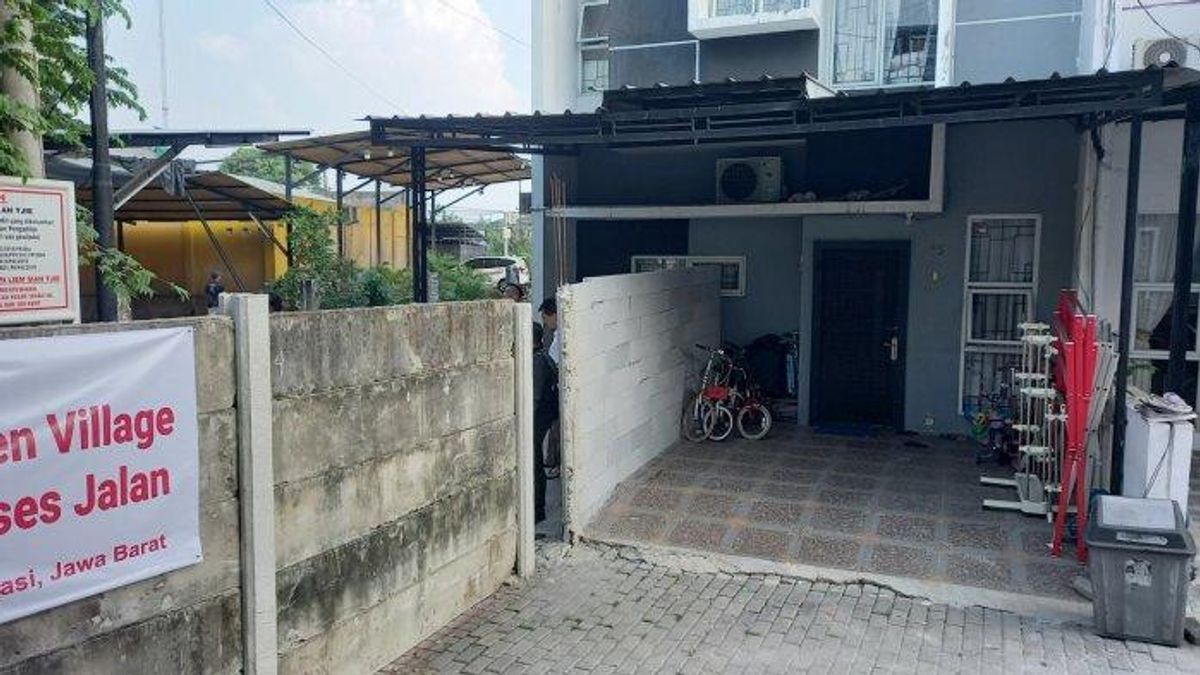JAKARTA Land dispute cases that occur in Green Village Housing, Bekasi can be a lesson to be more selective when buying a house as a place to live. Apart from being physical, home buyers must also know the credibility of the developer.
"Check the letters, the permits, the region. If necessary, check the city's plans first," said Deputy Chairperson of Real Estate Indonesia (REI), Bambang Ekajaya to VOI on June 28, 2023.
It is done to anticipate things that are not desirable in the future.
"Don't let us realize that after living for years, the house we live in is a disputed land," he continued.
Look what happened to the residents of 10 houses in Green Village Housing, Bekasi. The occupants no longer have access to and from the car because the road land in front of the house turns out to belong to other parties.
One of the 10 houses is even divided into two holdings. From a land area of 79 square meters, it turns out that 25 square meters belonged to Liem Sian Tjie.
Liem is known to be a resident of the land owner who had clashed with PT Surya Mitratama Persada (SMP) as the developer of Green Village Housing. Liem sued legally because he thought PT SMP had seized his land.
The court's decision won Liem. Then, on June 20, 2023, he created a guardrail and announced that the land that had been recognized as Green Village land was his land.
"The announcement of this land belongs to Liem Sian Tjie based on the ownership rights certificate (SHM) no.3063 issued from the Bekasi City BPN Office and a court decision with complete legal force (inkracht van gewijsde)," said the sentence attached to the wall fence.
A simple way that can be done to check the developer's credibility is from his track record. What property projects he has worked on. Then, also look at the results of the work, whether the construction is completed on time or often stalled.
Good developers complete their projects on time or faster than they should be without reducing the quality of the building. Meanwhile, poor developers complete development beyond the specified timeframe. Late development automatically adds to monthly expenses.
Then, whether the physical criteria described are in accordance with the reality. Also make sure the developer has the legality such as a Certificate of Ownership (SHM) or Building Permit (IMB).
If not, it means that development is carried out illegally. Having an IMB or a mandatory SHM in Indonesia. This is in accordance with the provisions of Law 28 of 2000 concerning Buildings.
"Now the times are sophisticated, it can be done via the internet. Looking at urban planning can also be done online. If you are in doubt, you can check directly with the sub-district office of the property area you want to buy," said Bambang.
The residents of Green Village, especially those directly affected by the land dispute, said Head of RW 07 Yunus Effendi, will take legal action. They suspect that there is an element of intent by the developer to trap its consumers.
Moreover, according to Yusuf, it is known that there are unscrupulous developers who deliberately move the soil stake.
"God willing, we will discuss with the residents and will take legal action to make criminal reports and civil lawsuits against developers, we suspect that there has been a criminal act committed by the developer," Yunus told reporters on June 26.
Bambang also assessed that this case could also be categorized as default if there was a statement from the developer that the land was part of a housing facility.
"If there is no statement either verbally or in writing, I don't think it can be called default," he said.
Law Number 8 of 1999 concerning Consumer Protection has regulated the rights and obligations of developers.
Developers as business actors, according to Article 7 of the Law, have an obligation to have good intentions in carrying out their business activities. Provide correct, clear, and honest information regarding the conditions and guarantees of goods and/or services as well as provide explanations for the use, repair and maintenance.
Developers are also prohibited from offering, promoting, advertising goods and/or services incorrectly and offering something that contains an uncertain promise as stated in Article 9 paragraph 1 point k.
If in the agreement, brochures, or other documents it turns out that the developer promised housing facilities, which were not fulfilled, then the developer had committed an unlawful act.
Related to that, consumers have the right to obtain advocacy, protection, and efforts to settle consumer protection disputes properly. Consumers can also receive compensation, compensation and/or replacement if the goods and/or services received are not in accordance with the agreement or not as appropriate. This is as stated in Article 4 point e and h of the Consumer Protection Law.
On the other hand, developers or business actors also have the right to defend themselves properly in the legal settlement of consumer disputes. Also, the right to rehabilitation if legally proven that consumer losses are not caused by traded goods and/or services, according to Article 6 points c and d.
In addition to taking legal action, residents hope that the government and related agencies can continue to facilitate so that there is the best solution.
Developers and related parties including banks are looking for solutions for residents of homeowners. Our residents buy in the right way, according to the law good buyers must be protected," added Yunus.
VOIR éGALEMENT:
The English, Chinese, Japanese, Arabic, and French versions are automatically generated by the AI. So there may still be inaccuracies in translating, please always see Indonesian as our main language. (system supported by DigitalSiber.id)














